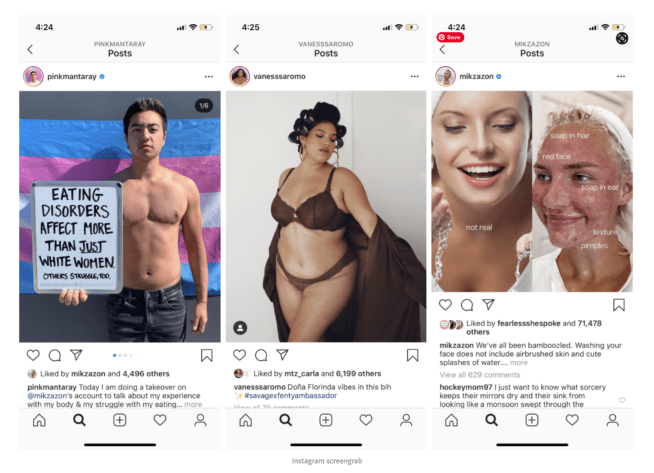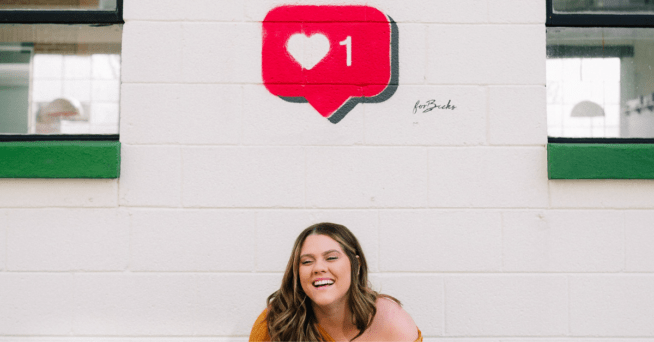In our image-obsessed culture, we’re appeased by likes and impressed by a large following on Instagram. We look to people we’ve never met for validation of our body, our homes, our relationships.
How did it get this way? Well, social media has certainly aided in society’s obsession with unattainable beauty, unrealistic bodies, and eternal youth— strategically advertised mostly by thin, attractive, young white women. Is it any wonder that so many of us who belong in the ‘other’ category struggle with our self-esteem?
Instagram in particular has been named in countless studies showing a correlation between the app and negative self-image and poor self-esteem. Researchers in Toronto conducted a case study of the results of 121 social media studies and:
“Found a small, significant, negative relationship between social network site use and self-esteem, suggesting that higher levels of social network site use are associated with lower levels of self-esteem.”
Exposure to idealized images of rich, famous, attractive people has also been found to have a devastating effect on our self-perception.
The worst part is that we justify the psychological harm by telling ourselves that the accounts we follow are purely #inspirational, #motivating, #goals. For some people, that may be true. But for those of us who are prone to depression, eating disorders, and self-esteem issues, it’s much more complicated. Dr. Suzana Flores explains:
“If a person’s reality does not match the digital illusion they post on their profiles, emotionally, one may feel they are not living up to the “best” form of themselves.”
Is it any wonder that so many of us who belong in the ‘other’ category struggle with our self-esteem?
Recently, I had a troubling experience with my self-image and I realized that Instagram was slowly distorting my perception of what real, everyday bodies looked like, mine included.
On my last (Pre-COVID) vacation, my friends and I rented a boat for the day. I decided on a light blue bikini with an oversized straw hat, and I felt beautiful. I’d worn the bikini before, but I’d never been photographed in it. And on this particular day, I had a photo taken of me in front of the ocean. I was laughing, completely enjoying myself with a drink in my hand.
But later that night as I browsed through the day’s photos, I looked at myself in that blue bikini, and how I looked did not match with how I thought I looked in it.
When I looked at my photo, all I saw was the visible fat underneath my bikini top and on my hips. I didn’t even notice my big smile and the dimple on my right cheek that only comes out when I’m really happy. I didn’t look at the beautiful blue water behind me or the bright sun on my face.
All I saw were my imperfections.
This is hard to admit, even in writing, but I opened a photo editing app and completely distorted the picture to make myself thinner and get rid of the fat on my stomach. That was the photo I wanted to share with my followers.
I got home from my trip and I spent some more time comparing the two photos: the photo of the real me versus this photoshopped fake me. And the more time I spent comparing the two, the easier I could spot the differences and the qualities about myself that made me feel unworthy.
I’ve always known the stretch marks were there, the rolls and the love handles too. I look in the mirror every day and I see them, but I tell myself they’re a part of who I am. It wasn’t until I began to post my photo on Instagram did I see realize how my body stood out in a sea of thin, perfect, smooth bodies.
This was not healthy, and I was aware.
Through social media, I had developed skewed beauty ideals because of the constant exposure of perfect, smooth, fatless bodies and forgotten what my real body actually looked like. And that my real body is normal.
But I knew if I posted the photo of that fake, smaller, thinner me, then I would be contributing to diet culture, body dysmorphia, and unattainable beauty standards in a world full of beautiful people who do not believe they’re beautiful.
Although I never posted either of the photos, this internal dialogue brought me to a realization that I desperately needed. I needed to change something about the way I was living because my real body deserved to be loved in that blue bikini.
I looked at my “Following” list on Instagram. It only took a few minutes to realize that the flawless and toned bodies I was viewing day after day were the reason why I looked at that photo of myself in the blue bikini and wanted to ‘fix’ so many parts of me.
I decided to unfollow anyone and everyone who made me self-conscious.
I was done with the perfect bodies on Instagram. I was done with subconsciously comparing myself to flawless, hairless, cellulite-free bodies online.
The criteria to survive my Instagram elimination was: “How do your photos make me feel about my body, my life, my relationships, and my job?”
If it’s good, you stay.
If I feel less than or that I’m missing out on something better, I unfollow. If I think that I’d be happier with your body instead of mine, I unfollow. If even for a moment, I‘ve considered buying diet products from you, I unfollow. Simple as that.
And yes, that includes my real-life friends. Because I think this needs to be said: we can still be friends in real life without knowing every move the other person makes on social media.
I followed ‘real’ accounts — health advocate, and body-positive models of all colors, shapes, and sizes. I wanted to follow influencers who show what their real-life bodies look like.
I discovered many amazing accounts, but I’ll list my favorites below:
- Vanessa Romo: Latina Model
- Mik Zazon: Body-Positive Influencer, Eating Disorder Recovery
- Schuyler Bailar: 1st trans D1 NCAA men’s athlete, Eating Disorder Recovery
- Sydney Grace: Recovery and Self-Love Advocate
I advise you to take a look at your social media following too.
We need to stop consuming content created and curated by people who have no genuine interest in facilitating self-love and we need to stop caring about strangers who make us feel unhappy and inferior.
After this social media following cleanse, now when I scroll through my feed, I see pictures like this:

Now, my Instagram reflects a much more authentic world.
I see people with acne and rolls on their bellies. I see people who aren’t posing their bodies in perfect angles all the time. I see people who look like me. And that matters to me because, while the world of perfect influencers who have the time, money, personal gyms, nutritionists, and personal trainers are undeniably attractive, that’s not the real world.
And if their reality isn’t reflective of ours, why would we use their images as a model for our happiness?
So the next time you spend time outside of your home, maybe at a pool or beach, take a look at the bodies around you. Not every person around looks like an Instagram model. Real bodies are of all sizes, shapes, ages, and colors. Real bodies have fat on their arms, hairy legs, razor bumps, and bellies. Cellulite, discoloration, and stretch marks. Gray hair, back hair, and bikini line hair. Acne and bacne. Disabled and able-bodied. C-section scars, small breasts, big breasts, or no breasts. All of these things make up real bodies.
Not to say that disciplined gym-goers and fitness influencers aren’t real and worthy, but right now we have a crisis on our hands that exists because all we see are gym-goers and fitness influencers. And we’ve forgotten that real bodies deserve to be heard and complimented and loved too.
I’m cognizant of the damage done to my self-esteem by frequently browsing photos of bodies built by personal chefs, personal trainers, a financially sound lifestyle, unlimited time, and access to resources. I, like many of you, do not have a life that looks like that. When we compare ourselves to bodies that are the products of resources we do not have, we might as well compare apples to oranges too.
It’s up to us to remember that social media is not a reflection of real-life people. Otherwise, we may forget what real-life, everyday people look like, and it will distort the way we look at other bodies and the way we look at our own. Besides, our bodies are just a small part of what makes up the wonderful beings that we are, but our image-obsessed culture has done an impressive job in making sure that we focus on almost nothing else.
Jessica Mendez is a full-time writer living in Las Vegas, NV. She received her bachelor’s degree in psychology from NAU and her master’s degree in family and human development from ASU. In 2018, she left her career in mental health to pursue a career in writing. She is currently working on her debut novel and a collection of bilingual poetry. Follow her on Twitter and Medium to read more of her work.
Image courtesy of Karsten Winegeart.












